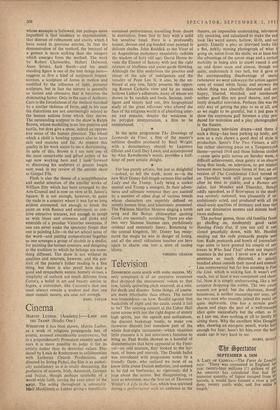Television • EDINBURGH came south with some success. My only
complaint is of an excessive reverence that dropped the announcers' voices to that low, faintly quivering pitch reserved, as a rule, for death and disaster. Some things, of course. are more televisablc than others. The tattoo was tremendous—as how, floodlit against that backcloth of night and the castle, could it fail to be? The opening concert at the Usher Hall came across with just the right degree of stately high spirits, just the squash and enthusiasm, the discreet backstage bustle, to make you (however distant) feel somehow part of the whole first-night excitement—which vicarious little pleasure it is just television's function to bring us. Paul Rothe showed us a handful of documentaries that have appeared at the Festi- val—an odd mixture, they looked to the lay- man, of bores and marvels. The Danish ballet was introduced with programme notes by a friendly Dane, who realised we most of us know little about Danish iesthetics; and seemed to be fed on beefsteaks, so vigorously did it leap about the screen. But disappointing, at least as television, was the first act of Thornton Wilder's A Life in the Sun, which was televised during a performance with an audience in the
theatre, an impossible undertaking, television ally speaking, and calculated to make the cas
look like weird sisters, hollow, and un gainly. Usually a play so televised looks lik a flat, jerkily moving photograph of what i going on, taken from the stalls; we at least ha the advantage of the apron stage and a certai mobility in being able to crawl round it an up and down steps and almost, though no quite, underneath it into hell, but it gave u the corresponding disadvantage of seein (whenever we went sideways) the action agains rows of round white faces; and anyway the whole thing was absurdly distanced and un happy, blurred, blotched, and incoheren neither good film nor good theatre, and pe fectly dreadful television. Perhaps this was the only way of getting the play to us at all, and so we ought to be grateful, but it just goes to show the enormous gulf between a play pro' duced for televisibn and a play photographed in the theatre.
Legitimate television drama—and there it such a thing—has been perking up lately, and now as a rule shows a good deal of style in production. Sutro's The Two Virtues, a silly but rather charming piece on a Tanquerayisb theme—period 1914 and those hideous clothes —came quite gaily across on Sunday week, difficult achievement, since gaiety is an elusive thing that tends, on television, to get mislaid between more boisterous forms of fun; an old version of The Confidential Clerk turned UP on Thursday week still green and vigoroul after its time in pickle; and a Romeo and Juliet, last Monday and Thursday, though oddly squashed, as if floor-space in the studio was severely rationed, was pleasantly if tic' ambitiously acted, and produced' with all the small-scale qualities of intimacy and ease that suit our diminutive screens and minute back room audience.
The parlour games, those old familiar faces, go chuffing on, moderately good value Harding Finds Out, if you can call it on closed gracefully down, with Mr. Hardin8 reading out the rude postcards people send him. Rude postcards and howls of journalistic rage seem to have greeted his couple of seri: tences in Who Said That? about our imperiol manners in the past : I never saw a few shon sentences so much distorted, so quickhr bandied about outside their mood and contest; Less controversial but far less amusing is Find the Link, which is sinking fast. It wasn't eve much, but at least it was competent and cheer: ful. Now it is simply embarrassing, like a boo conjuror dropping the rabbit. The two younI women are good; but the chairman, though, boisterous, is neither reassuring nor cosy, an° the two men who recently joined the panel arc quite deplorable. One has a certain goo0 charm and plays the part of a well-meanini idiot quite successfully but the other, as Of as I can see, does nothing at all to justify lilt sitting there. Why the excellent Miss Douglot who, chewing an energetic pencil, works har°, enough for four, hasn't hit him. over the hes° weeks ago is very hard to see. ISABEL QUO,/


































 Previous page
Previous page